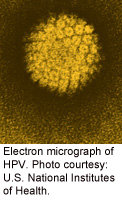But rarely seen after treatment; correlations for persistent HPV16 DNA with worse survival
THURSDAY, July 30, 2015 (HealthDay News) — Human papillomavirus (HPV) type 16 DNA in oral rinses is common at diagnosis of HPV-related oropharyngeal carcinoma (HPV-OPC), according to a study published online July 30 in JAMA Oncology.
In a prospective cohort study, Eleni M. Rettig, M.D., from the Johns Hopkins University School of Medicine in Baltimore, and colleagues examined whether HPV DNA detection in oral rinses after treatment for HPV-OPC correlates with recurrence and survival. Oral rinse samples were obtained at diagnosis and after treatment for 124 patients with incident HPV-OPC.
The researchers identified oral HPV16 DNA in 54 percent of participants at diagnosis, and in only 5 percent (six patients) after treatment. Five patients had persistent oral HPV16 DNA, identified at diagnosis and after treatment. Two-year disease-free survival (DFS) was 92 percent, and overall survival (OS) was 98 percent. There were correlations for persistent oral HPV16 DNA with worse DFS and OS (hazard ratios, 29.7 and 23.5, respectively). All patients with persistent oral HPV16 DNA developed recurrent disease; local disease involvement was seen in three patients. In contrast, 8 percent of those without persistent oral HPV16 DNA developed recurrent disease, with local disease involvement in 11 percent of those.
“Our data suggest that, although infrequent, persistent HPV16 DNA in post-treatment oral rinses is associated with poor prognosis and is a potential tool for long-term tumor surveillance, perhaps more so for local recurrence,” the authors write.
Several authors disclosed financial ties to the pharmaceutical and biotechnology industries.
Copyright © 2015 HealthDay. All rights reserved.








